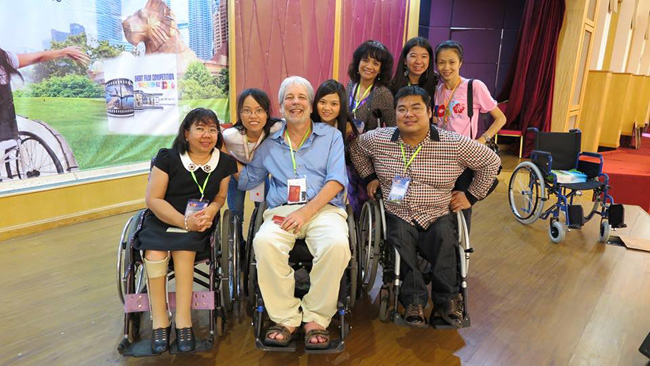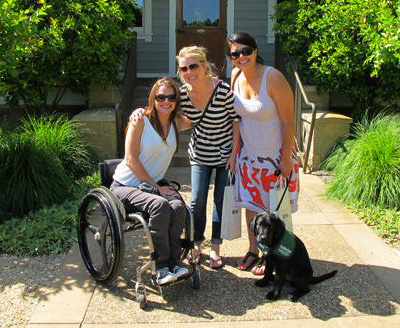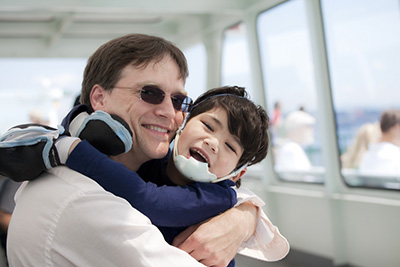
Life throws us some pretty ugly curve balls. Mine was Multiple Sclerosis. At the precise moment that our lives are altered, we have two choices. One, crawl under a rock and let it consume us. Two, hold our heads up high and dig deep for copious amounts of strength, and get on with life.
A career change from social work to travel was a relatively easy choice. I was fortunate and have travelled extensively, both pre- & post-MS. I just needed to learn how to assist others to do the same. What was once a passion became my own business as an ‘Accessible Travel Specialist’. In my 15 years at a large agency in Canada, I became very aware of how under-serviced the disabled traveller is. If you have seen the various articles written about this ‘niche’, you have undoubtedly seen this not as a niche market in the travel sector, but an opportunity.
 The Baby Boomer generation is retiring and it is estimated the Boomer generation will equate to almost 60% of U.S. wealth. In the travel sector, Boomers will account for over 50% of consumption. Now consider this: over 40% of these Baby Boomers will be retiring with some form of disability, which increases the value of this sector alone to over 25% of the market by 2020. What has become apparent is that the travel agencies and travel suppliers will need to act quickly to learn how ‘Inclusive’ the world is becoming. I must say that the contacts that I work with on a global scale have seen and are addressing the need.
The Baby Boomer generation is retiring and it is estimated the Boomer generation will equate to almost 60% of U.S. wealth. In the travel sector, Boomers will account for over 50% of consumption. Now consider this: over 40% of these Baby Boomers will be retiring with some form of disability, which increases the value of this sector alone to over 25% of the market by 2020. What has become apparent is that the travel agencies and travel suppliers will need to act quickly to learn how ‘Inclusive’ the world is becoming. I must say that the contacts that I work with on a global scale have seen and are addressing the need.
Gone are the days of only booking an accessible stateroom on a cruise. The disabled traveller now wants more options. Imagine that someone in a wheelchair can take a gondola ride in Venice, while remaining in their chair, or visiting Machu Picchu, or the Caribbean, or other ‘not typical’ destinations. The special needs traveller encompasses more than the wheelchair user. What about a child with Autism or Down Syndrome? This is a demographic that most travel agents also fail to see as an important segment requiring something more than the ‘cookie-cutter’ holiday at an all-inclusive resort, where the kids’ club is grouped by age and not ability. Does today’s travel adviser know their game and can they adequately provide useful information? Can they assist the families by pre-planning using DVDs, books, etc.? This is where serendipity fits in. As a social worker, I assisted families with a special needs child.
 Can you answer which cruise line offers specialty services for families with children that fit into the list that I have previously identified? Sadly the answer is not common knowledge.
Can you answer which cruise line offers specialty services for families with children that fit into the list that I have previously identified? Sadly the answer is not common knowledge.
My friend, colleague and disability activist Dr. Scott Rains, asks: “What if the first question we asked was, ‘What is so unique about this situation that it justifies exclusion?’ instead of, ‘How much does it cost to make it accessible?’ Universal design is based on inclusivity and ease of use.” He and others say we need to approach projects from the outset using the principles of what is known as ‘universal design‘, where we design our lodges and buses and tours inclusively, so the maximum number can benefit. Rather than one special table at a picnic site adapted for wheelchairs, you ensure that all tables are designed to allow wheelchairs to roll under one end. It needn’t be a difficult journey. It just involves taking a different approach.
Perhaps we should arrange and encourage responsible tourism. And it should to be presented not as a niche, but as today’s ‘normal’. Inclusivity will replace accessible as a common phrase within the travel industry. Let the non-compliant explain why they choose to not be ‘the norm’.
For more information or to contact Tariata, you can go to her website taritastravelconnections.com.